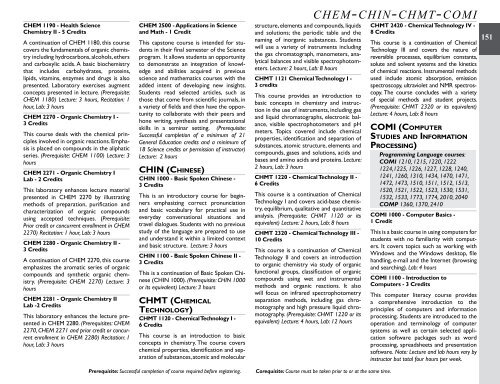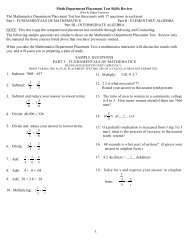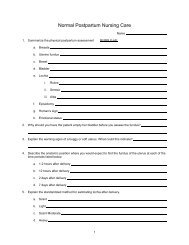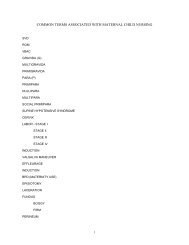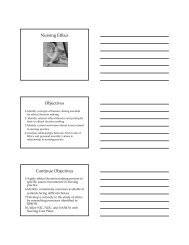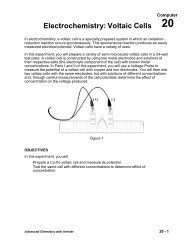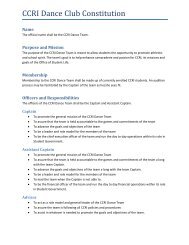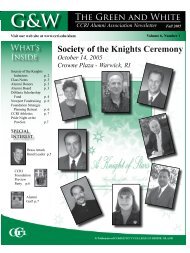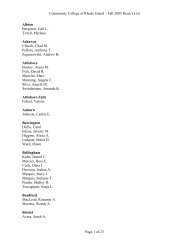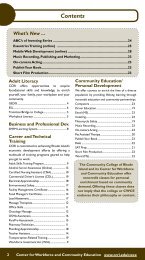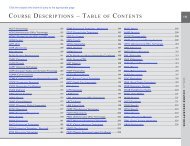Course Descriptions - Community College of Rhode Island
Course Descriptions - Community College of Rhode Island
Course Descriptions - Community College of Rhode Island
You also want an ePaper? Increase the reach of your titles
YUMPU automatically turns print PDFs into web optimized ePapers that Google loves.
CHEM 1190 - Health Science<br />
Chemistry II - 5 Credits<br />
A continuation <strong>of</strong> CHEM 1180, this course<br />
covers the fundamentals <strong>of</strong> organic chemistry<br />
including hydrocarbons, alcohols, ethers<br />
and carboxylic acids. A basic biochemistry<br />
that includes carbohydrates, proteins,<br />
lipids, vitamins, enzymes and drugs is also<br />
presented. Laboratory exercises augment<br />
concepts presented in lecture. (Prerequisite:<br />
CHEM 1180) Lecture: 3 hours, Recitation: 1<br />
hour, Lab: 3 hours<br />
CHEM 2270 - Organic Chemistry I -<br />
3 Credits<br />
This course deals with the chemical principles<br />
involved in organic reactions. Emphasis<br />
is placed on compounds in the aliphatic<br />
series. (Prerequisite: CHEM 1100) Lecture: 3<br />
hours<br />
CHEM 2271 - Organic Chemistry I<br />
Lab - 2 Credits<br />
This laboratory enhances lecture material<br />
presented in CHEM 2270 by illustrating<br />
methods <strong>of</strong> preparation, purification and<br />
characterization <strong>of</strong> organic compounds<br />
using accepted techniques. (Prerequisite:<br />
Prior credit or concurrent enrollment in CHEM<br />
2270) Recitation: 1 hour, Lab: 3 hours<br />
CHEM 2280 - Organic Chemistry II -<br />
3 Credits<br />
A continuation <strong>of</strong> CHEM 2270, this course<br />
emphasizes the aromatic series <strong>of</strong> organic<br />
compounds and synthetic organic chemistry.<br />
(Prerequisite: CHEM 2270) Lecture: 3<br />
hours<br />
CHEM 2281 - Organic Chemistry II<br />
Lab -2 Credits<br />
This laboratory enhances the lecture presented<br />
in CHEM 2280. (Prerequisites: CHEM<br />
2270, CHEM 2271 and prior credit or concurrent<br />
enrollment in CHEM 2280) Recitation: 1<br />
hour, Lab: 3 hours<br />
CHEM 2500 - Applications in Science<br />
and Math - 1 Credit<br />
This capstone course is intended for students<br />
in their final semester <strong>of</strong> the Science<br />
program. It allows students an opportunity<br />
to demonstrate an integration <strong>of</strong> knowledge<br />
and abilities acquired in previous<br />
science and mathematics courses with the<br />
added intent <strong>of</strong> developing new insights.<br />
Students read selected articles, such as<br />
those that come from scientific journals, in<br />
a variety <strong>of</strong> fields and then have the opportunity<br />
to collaborate with their peers and<br />
hone writing, synthesis and presentational<br />
skills in a seminar setting. (Prerequisite:<br />
Successful completion <strong>of</strong> a minimum <strong>of</strong> 21<br />
General Education credits and a minimum <strong>of</strong><br />
18 Science credits or permission <strong>of</strong> instructor)<br />
Lecture: 2 hours<br />
Chin (ChineSe)<br />
CHIN 1000 - Basic Spoken Chinese -<br />
3 Credits<br />
This is an introductory course for beginners<br />
emphasizing correct pronunciation<br />
and basic vocabulary for practical use in<br />
everyday conversational situations and<br />
travel dialogues. Students with no previous<br />
study <strong>of</strong> the language are prepared to use<br />
and understand it within a limited context<br />
and basic structure. Lecture: 3 hours<br />
CHIN 1100 - Basic Spoken Chinese II -<br />
3 Credits<br />
This is a continuation <strong>of</strong> Basic Spoken Chinese<br />
(CHIN 1000). (Prerequisite: CHIN 1000<br />
or its equivalent) Lecture: 3 hours<br />
ChmT (ChemiCAl<br />
TeChnology)<br />
CHMT 1120 - Chemical Technology I -<br />
6 Credits<br />
This course is an introduction to basic<br />
concepts in chemistry. The course covers<br />
chemical properties, identification and separation<br />
<strong>of</strong> substances, atomic and molecular<br />
structure, elements and compounds, liquids<br />
and solutions; the periodic table and the<br />
naming <strong>of</strong> inorganic substances. Students<br />
will use a variety <strong>of</strong> instruments including<br />
the gas chromatograph, manometers, analytical<br />
balances and visible spectrophotometers.<br />
Lecture: 2 hours, Lab: 8 hours<br />
CHMT 1121 Chemical Technology I -<br />
3 credits<br />
This course provides an introduction to<br />
basic concepts in chemistry and instruction<br />
in the use <strong>of</strong> instruments, including gas<br />
and liquid chromatographs, electronic balance,<br />
visible spectrophotometers and pH<br />
meters. Topics covered include chemical<br />
properties, identification and separation <strong>of</strong><br />
substances, atomic structure, elements and<br />
compounds, gases and solutions, acids and<br />
bases and amino acids and proteins. Lecture:<br />
2 hours, Lab: 3 hours<br />
CHMT 1220 - Chemical Technology II -<br />
6 Credits<br />
This course is a continuation <strong>of</strong> Chemical<br />
Technology I and covers acid-base chemistry,<br />
equilibrium, qualitative and quantitative<br />
analysis. (Prerequisite: CHMT 1120 or its<br />
equivalent) Lecture: 2 hours, Lab: 8 hours<br />
CHMT 2320 - Chemical Technology III -<br />
10 Credits<br />
This course is a continuation <strong>of</strong> Chemical<br />
Technology II and covers an introduction<br />
to organic chemistry via study <strong>of</strong> organic<br />
functional groups, classification <strong>of</strong> organic<br />
compounds using wet and instrumental<br />
methods and organic reactions. It also<br />
will focus on infrared spectrophotometry<br />
separation methods, including gas chromotography<br />
and high pressure liquid chromotography.<br />
(Prerequisite: CHMT 1220 or its<br />
equivalent) Lecture: 4 hours, Lab: 12 hours<br />
Prerequisite: Successful completion <strong>of</strong> course required before registering. Corequisite: <strong>Course</strong> must be taken prior to or at the same time.<br />
chem-chin-chmt-comi<br />
CHMT 2420 - Chemical Technology IV -<br />
8 Credits<br />
This course is a continuation <strong>of</strong> Chemical<br />
Technology III and covers the nature <strong>of</strong><br />
reversible processes, equilibrium constants,<br />
solute and solvent systems and the kinetics<br />
<strong>of</strong> chemical reactions. Instrumental methods<br />
used include atomic absorption, emission<br />
spectroscopy, ultraviolet and NMR spectroscopy.<br />
The course concludes with a variety<br />
<strong>of</strong> special methods and student projects.<br />
(Prerequisite: CHMT 2320 or its equivalent)<br />
Lecture: 4 hours, Lab: 8 hours<br />
Comi (CompuTer<br />
STuDieS AnD informATion<br />
proCeSSing)<br />
Programming Language courses:<br />
COMI 1210, 1215, 1220, 1222<br />
1224,1225, 1226, 1227, 1228, 1240,<br />
1241, 1260, 1310, 1434, 1470, 1471,<br />
1472, 1473, 1510, 1511, 1512, 1513,<br />
1520, 1521, 1522, 1523, 1530, 1531,<br />
1532, 1533, 1773, 1774, 2010, 2040<br />
COMP 1360, 1370, 2410<br />
COMI 1000 - Computer Basics -<br />
1 Credit<br />
This is a basic course in using computers for<br />
students with no familiarity with computers.<br />
It covers topics such as working with<br />
Windows and the Windows desktop, file<br />
handling, e-mail and the Internet (browsing<br />
and searching). Lab: 4 hours<br />
COMI 1100 - Introduction to<br />
Computers - 3 Credits<br />
This computer literacy course provides<br />
a comprehensive introduction to the<br />
principles <strong>of</strong> computers and information<br />
processing. Students are introduced to the<br />
operation and terminology <strong>of</strong> computer<br />
systems as well as certain selected application<br />
s<strong>of</strong>tware packages such as word<br />
processing, spreadsheets and presentation<br />
s<strong>of</strong>tware. Note: Lecture and lab hours vary by<br />
instructor but total four hours per week.<br />
151


